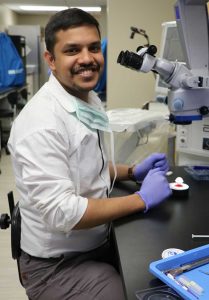
Dr. Rishabh Gupta came to Madison, Wisconsin to further his training in the field of ophthalmology. While he came away with new skills and enhanced confidence, he found a new family, too.
Gupta, a senior ophthalmology resident at Dr. Shroff’s Charity Eye Hospital (SCEH) in New Delhi, India, spent a five-week residency research and clinical observership with the Department of Ophthalmology and Visual Sciences (DOVS) at UW-Madison late last year.
The department’s Global Ophthalmology Initiatives Research and Clinical Observership program started in 2017, thanks to a sponsorship from the non-profit Combat Blindness International (CBI) from 2017 – 2022. During that time, the UW and CBI sponsored four senior ophthalmology residents in training from the University of Sao Paulo, Brazil. This year, the program has expanded and will now be offered on a rotating basis to all established departmental global partners.
Gupta is the first resident from SCEH to rotate at the UW through this program.
“I always wanted to be a surgeon,” Gupta said, “because surgeons have the ability to treat a disease with their own hands – in real time. In medical practice, there’s often a wait, as medications can take time to work on their own.”
Gupta had several options after graduating from medical school. “I chose ophthalmology based on the excitement that you feel when you treat patients’ eyes,” he said. “And the satisfaction that you get when you enable someone to see.”
This unique program provides a global ophthalmology resident the opportunity to spend five weeks with DOVS faculty, observing in clinic and the operating room, participating in educational opportunities, and contributing to research under the guidance of a faculty mentor.
Though he hasn’t officially decided on a subspeciality, Gupta’s interest in cornea, external disease, and refractive surgery led him to partner with the UW Health cornea specialists Sarah Nehls, MD and Evan Warner, MD during his stay.
“Cornea as a subspeciality is appealing because of the number of diseases that you have the opportunity to treat,” Gupta said.
In addition to observations in clinical and surgical services, Gupta honed his skills with Dr. Warner in the wet lab and participated in the department’s annual Right to Sight Eye Clinic, another partnership with CBI. He also collaborated with Dr. Nehls and cornea fellow Dr. Anna Walsh on a research project that analyzes the satisfaction of patients who underwent a specific type of cataract surgery – one that utilizes a new lens implant technique.
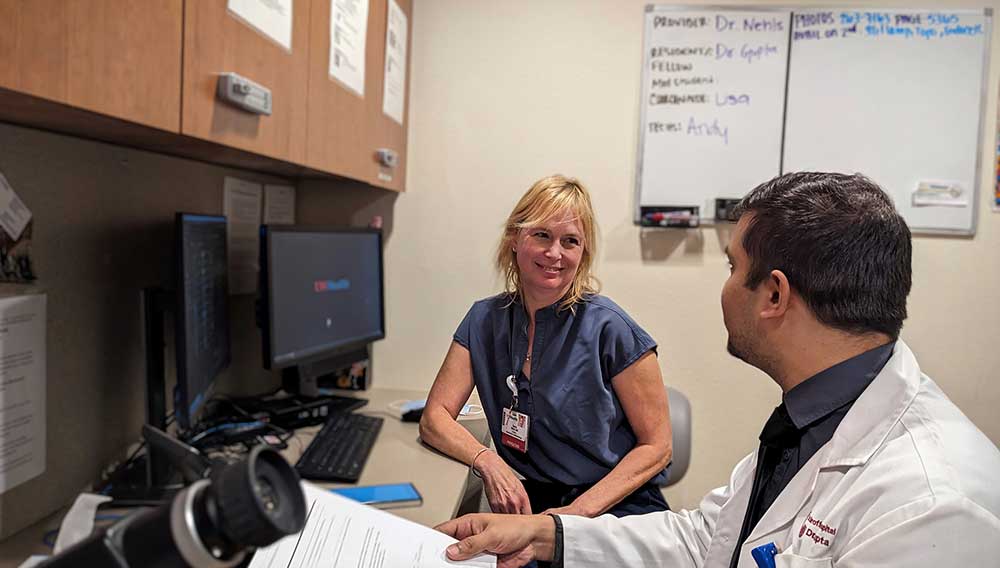
“We do this procedure in India,” Gupta said. “But we are focused on the clinical outcomes – not patient satisfaction. Both are important. So, this project will add to the overall body of knowledge.”
Gupta noted differences between patient care tissue needs in the United States relative to India. Corneal transplant surgical preparation is completed in the operating room in India, for example. In the United States, the processing generally occurs in an eye bank. Despite these differences, Gupta noted that the primary goal of providing excellent service is the same.
“How you approach the goal is different between the two countries,” Gupta said. “For example, what we would consider the first step in the treatment of a particular disease – like glaucoma – in India would be the second step over here – and vice versa. In India, we prefer trabeculectomy as first option in the treatment of glaucoma. And, if that doesn’t work, we turn to tube shunts as a second procedure. It’s done the other way around in the United States.”
For Gupta, whose next step is to complete a fellowship back home at SCEH, the five-week observership was his first experience to study outside of his home country. “Having the opportunity to study in a foreign country has made me a better doctor,” he said. “This is a great program because you get to experience a lot of different things – clinical activities, educational activities, operational activities, offsite clinic experiences, and wet lab – in a short time.”
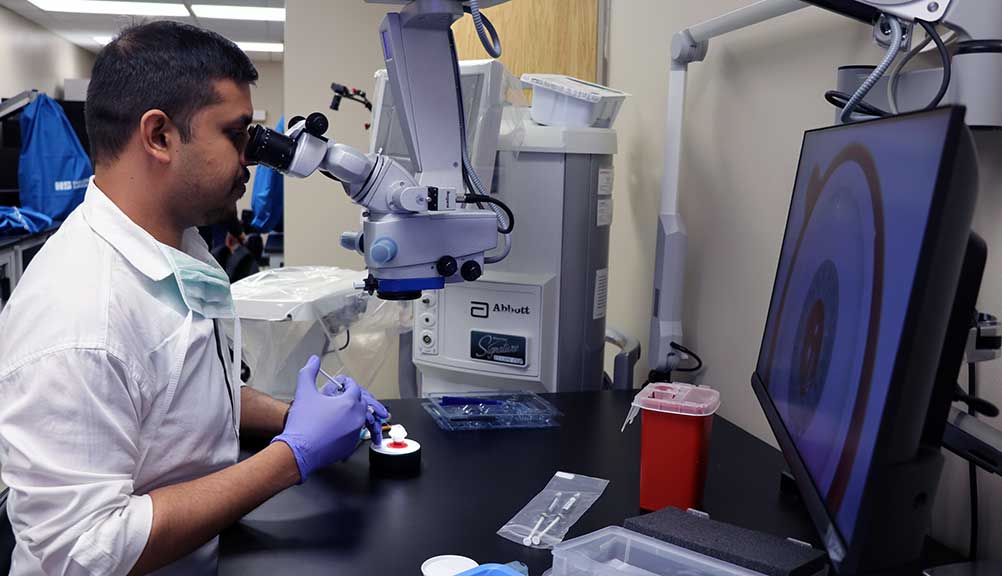
“I will return to India with a lot of information on how to disclose information to patients and how to counsel them,” Gupta added. “In India, the patient load is very high, so we don’t get much time with each patient. That means some of the follow-up is performed by other professionals, not the doctor. But, in the United States, there is more direct doctor-to-patient contact. Back home, if I want to do that for some of my patients, I am more confident that I could do it well.”
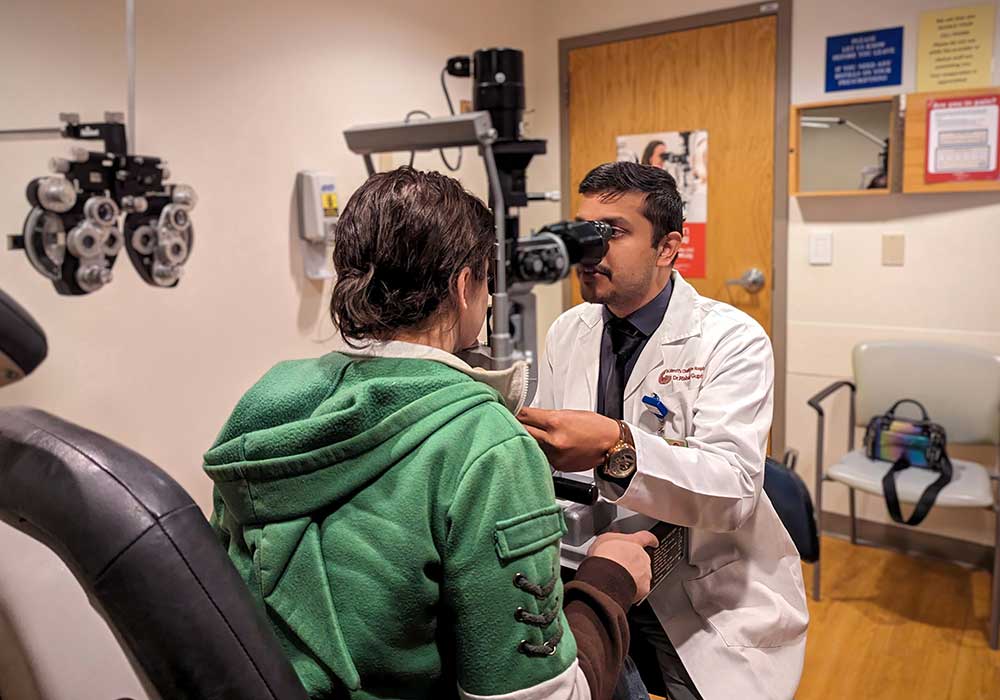
Gupta’s experience in Madison wasn’t all work. He found time for hiking, attending a concert, shopping, visiting the Memorial Union, and dining with the DOVS education team and the other ophthalmology residents.
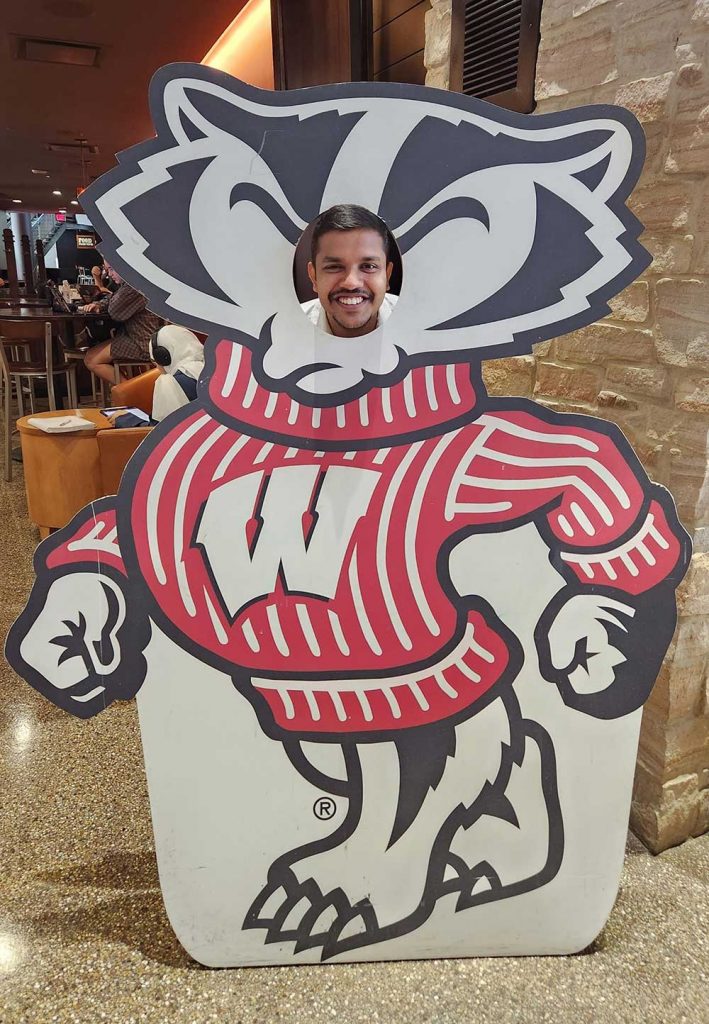
During his stay, Gupta built strong bonds and credits the DOVS faculty and education team with making him feel comfortable. He specifically noted Senior Graduate Medical Education Program Manager, Hannah Baker. “I’m really grateful to Hannah,” he said. “She was instantly a friend to me. In my first week, she helped me navigate the bus and the buildings. She took me to lunch. I had so many questions even before coming here, and she answered them all.”
“Five weeks is not a long time, but it’s not a short time either,” Gupta said. “When you are away from your home, you miss it, and you miss your family. But I have a home now in Madison.”